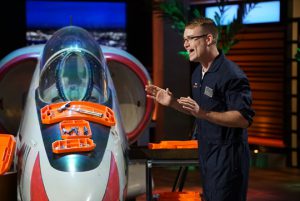Tom Burden, who graduated in 2014 with a bachelor’s degree in mechanical engineering technology, introduced his solution to mechanics frustrated by their tools sliding off aircraft while they work — the Grypmat. The flexible, non-slip tool mat is made of a unique polymer-silicone blend that helps grip tools and keep them in place at extreme angles of up to 70 degrees.
Burden came to “Shark Tank” with experience successfully pitching his idea. He won the University’s Pitch & Pour competition while a student at UT and is returning next week to serve as a judge for the sixth annual entrepreneurial business pitch competition. Five teams will pitch their ideas at the local startup pitch event sponsored by the UT LaunchPad Incubation program Thursday, Nov. 16, at 5:30 p.m. in the Nitschke Technology Commercialization Complex.“It was pretty nerve-wracking to pitch this idea that I created up in my basement in front of billionaires,” Burden said. “I’m standing there on set next to a jet getting the opportunity to tell them all about how my invention helps mechanics like me keep their tools in place while they work.”So what did the sharks think? You have to tune in at 9 p.m. Sunday, Nov. 12, to find out. The episode Burden participated in included guest shark Richard Branson, the founder of Virgin Group, in addition to investors Mark Cuban, Daymond John, Lori Greiner and Robert Herjavec.
“We are incredibly proud of what Tom has accomplished with the Grypmat,” said Jessica Sattler, director of economic engagement and business development programs at UT. “Tom was one of our first clients here at LaunchPad, and we knew he had potential as an entrepreneur from the start. His work ethic, coachability, and willingness to utilize and leverage all the resources at his disposal convinced us of his path to success early on.”
An F-16 mechanic in the U.S. Air Force, Burden knew firsthand the frustration of not having his tools within reach. He was inspired by a nonslip mat for the car dashboard to come up with a similar solution geared toward mechanics.
The CAD training skills he learned in the UT classroom helped him design his product. The resources at the UT Launchpad Incubation helped him put the Grypmat in the market.
“The University helped me take this idea and turn it into a real product that is now available for sale not just to aircraft mechanics, but those who work on cars or boats or any number of projects where it is important to keep your tools organized,” Burden said.
For more information about Grypmat, visit grypmat.com. To learn more about the UT Launchpad Incubation program, visit utoledo.edu/incubator.


